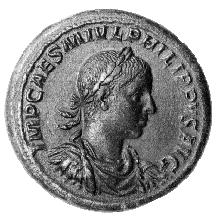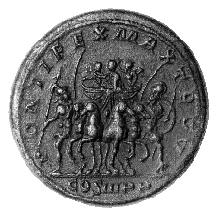



(118) Philip I - AE medallion, A.D. 248, 51.29 g. (inv. 91.221).
Obverse: Laureate, draped, and cuirassed bust of Philip
II r.; IMP(ERATOR) CAES(AR) M(ARCVS) IVL(IVS) PHILIPPVS AVG(VSTVS): Imperator
Caesar Marcus Iulius Philippus Augustus.
Reverse: In a facing quadriga led by two soldiers, each
with spear and shield, Philip I,
holding branch and crowned by Victoria, and Philip II, with right hand extended;
PONTIFEX MAX(IMVS) TR(IBVNICIA) P(OTESTATE) V: pontifex maximus,
with tribunician power for the fifth time; in exergue, CO(N)S(VL) III P(ATER)
P(ATRIAE): consul for the third time, father of the country.
Provenance: Bank Leu, 1985.
Bibliography: J.P.C. Kent, Roman Coins (London 1978)
311 no. 457 (similar reverse).
Marcus Julius Philippus was born in the Roman province of Arabia and is
thus often called Philip the Arab. In A.D. 243 he became praetorian prefect
under the young emperor Gordian III, whom he murdered within a year. He
made peace with the Persians, who had invaded Roman territory under Gordian,
and set about building a dynasty on the model of the Antonines and Severans.
He made his son, Philip, Caesar in A.D. 244 and, although he was still very
young, shared the consulate with him and raised him to the rank of Augustus
in A.D. 247. Philip did not live to carry out his plans, however, because
the troops at the Danube proclaimed a reluctant Decius emperor, and Philip
died when Decius engaged him in battle at Verona in A.D. 249. Philip II
was killed at about the same time.
In A.D. 245 the German Carpi attacked the frontier and engaged Philip's
troops until A.D. 247, when he returned in triumph to Rome. In a series
of medallions in A.D. 247 and 248 he celebrated his great triumph, as well
as the elevation of Philip II to Augustus that accompanied it. Father and
son are crowned by Victoria in their triumphal chariot. Although the titles
on the reverse belong to Philip I, the beardless bust on the obverse depicts
Philip II.
C.L.L.



All contents copyright (c) 1996.
Lawrence University
All rights reserved.